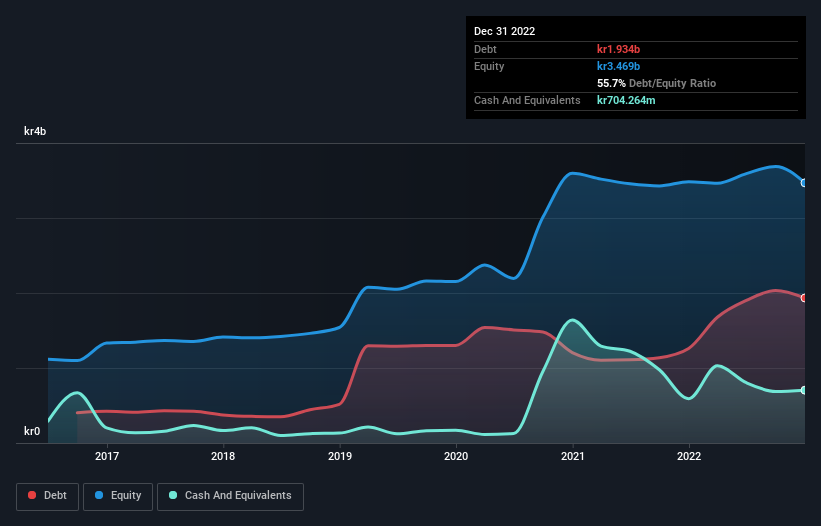Some say volatility, rather than debt, is the best way to think about risk as an investor, but Warren Buffett famously said that 'Volatility is far from synonymous with risk.' So it seems the smart money knows that debt - which is usually involved in bankruptcies - is a very important factor, when you assess how risky a company is. We note that Hexagon Composites ASA (OB:HEX) does have debt on its balance sheet. But the more important question is: how much risk is that debt creating?
Why Does Debt Bring Risk?
Debt assists a business until the business has trouble paying it off, either with new capital or with free cash flow. Ultimately, if the company can't fulfill its legal obligations to repay debt, shareholders could walk away with nothing. However, a more common (but still painful) scenario is that it has to raise new equity capital at a low price, thus permanently diluting shareholders. Of course, the upside of debt is that it often represents cheap capital, especially when it replaces dilution in a company with the ability to reinvest at high rates of return. When we examine debt levels, we first consider both cash and debt levels, together.
View our latest analysis for Hexagon Composites
What Is Hexagon Composites's Net Debt?
The image below, which you can click on for greater detail, shows that at December 2022 Hexagon Composites had debt of kr1.93b, up from kr1.26b in one year. However, it does have kr704.3m in cash offsetting this, leading to net debt of about kr1.23b.

How Healthy Is Hexagon Composites' Balance Sheet?
The latest balance sheet data shows that Hexagon Composites had liabilities of kr2.00b due within a year, and liabilities of kr2.43b falling due after that. Offsetting this, it had kr704.3m in cash and kr886.7m in receivables that were due within 12 months. So its liabilities outweigh the sum of its cash and (near-term) receivables by kr2.84b.
While this might seem like a lot, it is not so bad since Hexagon Composites has a market capitalization of kr5.94b, and so it could probably strengthen its balance sheet by raising capital if it needed to. But it's clear that we should definitely closely examine whether it can manage its debt without dilution. The balance sheet is clearly the area to focus on when you are analysing debt. But it is future earnings, more than anything, that will determine Hexagon Composites's ability to maintain a healthy balance sheet going forward. So if you're focused on the future you can check out this free report showing analyst profit forecasts.
In the last year Hexagon Composites wasn't profitable at an EBIT level, but managed to grow its revenue by 39%, to kr4.9b. Shareholders probably have their fingers crossed that it can grow its way to profits.
Caveat Emptor
Despite the top line growth, Hexagon Composites still had an earnings before interest and tax (EBIT) loss over the last year. Indeed, it lost kr403m at the EBIT level. When we look at that and recall the liabilities on its balance sheet, relative to cash, it seems unwise to us for the company to have any debt. Quite frankly we think the balance sheet is far from match-fit, although it could be improved with time. However, it doesn't help that it burned through kr484m of cash over the last year. So in short it's a really risky stock. There's no doubt that we learn most about debt from the balance sheet. However, not all investment risk resides within the balance sheet - far from it. For example, we've discovered 1 warning sign for Hexagon Composites that you should be aware of before investing here.
If, after all that, you're more interested in a fast growing company with a rock-solid balance sheet, then check out our list of net cash growth stocks without delay.
Valuation is complex, but we're here to simplify it.
Discover if Hexagon Composites might be undervalued or overvalued with our detailed analysis, featuring fair value estimates, potential risks, dividends, insider trades, and its financial condition.
Access Free AnalysisHave feedback on this article? Concerned about the content? Get in touch with us directly. Alternatively, email editorial-team (at) simplywallst.com.
This article by Simply Wall St is general in nature. We provide commentary based on historical data and analyst forecasts only using an unbiased methodology and our articles are not intended to be financial advice. It does not constitute a recommendation to buy or sell any stock, and does not take account of your objectives, or your financial situation. We aim to bring you long-term focused analysis driven by fundamental data. Note that our analysis may not factor in the latest price-sensitive company announcements or qualitative material. Simply Wall St has no position in any stocks mentioned.
About OB:HEX
Hexagon Composites
Provides alternative fuel systems and solutions to commercial vehicles and gas distribution companies worldwide.
Undervalued with high growth potential.
Similar Companies
Market Insights
Community Narratives




